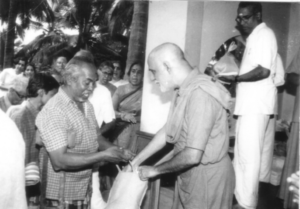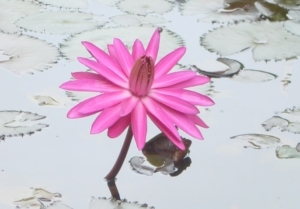Ashram Diary
It works unawares
Swami Nirviseshananda Tirtha
The life in the Ashram those days was extremely austere and simple. It was not that the Ashram did not have enough resources; there was no feeling of need for anything more.
The life in the Ashram those days was extremely austere and simple. The main building was essentially a two-roomed mud cottage with a clay-tile roof. The simple doors and windows were painted blue years back by Swamiji himself. There were only two chairs (cane chairs, also painted blue) – one for Swamiji and the other for Mātāji – and a table for Swamiji to work with his typewriter.
The leaks in the tiled roof used to be repaired occasionally; but slowly they became irreparable, and we were satisfied placing buckets at five-six places wherever the roof leaked. Never did we forget that when Swamiji started staying in this Ashram, there were no shutters for the doors and windows. Even the roof work Swamiji had asked the carpenter to stop midway because there was no money to pay.
In fact, reconstructing the Ashram building became crucial when we found that we were not able to print any more books written by Swamiji because there was no storage space, and whatever books we had stored in the lofts, got damaged by water-leakage.
The food was very simple, almost the same throughout the year, except on special occasions. Although there was a gas connection, most of the cooking was done on firewood ovens. Mā as well as I had to learn how to keep the deceptive flame alive while the cooking was on.
It was not that the Ashram did not have enough resources; there was no feeling of need for anything more. The available resources were used for running the publications, the socio-religious reformation movements, supporting in a small way the needy villagers for education, marriages, and medicines, or for making wells and sanitary latrines. None ever felt that part of the resources could be used to improve the Ashram facilities, except whatever was thought essential for functional purposes.
The small gate at the entrance staircase used to be left open at night and the telephone receiver kept on the outer verandah parapet. Swamiji explained to us that this was the only telephone in the village, and therefore we must keep it available for the villagers to call the hospital, taxi or police in an emergency. The mud road in front was too steep, and often hearing the screeching sound of bullock carts, we used to go down to give a helping hand to the heaving bullocks. Much later, the gradient was reduced and the road metalled by the village Panchayat.
During the first rain of the season, there would be fear of waterlogging and consequent landslides. So, whether it was midday or midnight, hearing the rains, Swamiji would come out with a spade and start clearing the rainwater drains, ensuring that the water flowing down from the upper terraces did not get obstructed by fallen leaves or mud. My responsibility was to helplessly watch the Guru doing the spadework and try to hold the umbrella correctly on his head. Swamiji had told us that long back, before the terracing of the garden was done, water would flow so powerfully with occasional landslides that once a calf was swept away by the rains.
All these so-called mundane work Swamiji used to do with joyful ease and involvement, never feeling disturbed that his writing or other so called spiritual works were getting hindered, or feeling lethargic when the body needed rest. Whenever anybody would come to see Swamiji, he would come out leaving whatever he had been doing, and listen to and talk to the visitor or help-seeker with full interest and concern. All along we have been amazed to find this extremely rare but natural, relaxed behaviour of a Knower, described as “sahaja” in the scriptures.
We learnt that it is only because of lethargy and inattention that we leave the telephone and other instruments unclean and uncovered, the lights and fans on, the tower-bolts improperly put, the place around untidy, and the guests and visitors unattended or not properly cared for. Common excuses given by the seekers in such matters – like vairāgya, meditative absorption, “no time” or “listening to Swamiji attentively”– are mostly a self-deception. True vairāgya or lack of selfishness leads to sincere love, attention and concern for everything and everyone around.
Swamiji had told us about his initial days in the Ashram, when he was given to long hours of meditation. One day a villager had come to see him and he was finding it difficult to come out of absorption. That day he decided: “Enough of meditation! If meditation is going to hinder my natural attention to people or work, then I do not need it.” That was the end of his “meditational indulgence”. Thereafter he has only been putting others into meditation.
Soon after we came to the Ashram, once after the day’s hard work, Swamiji was in the front verandah sitting leisurely on his cane-chair. We were on the floor sitting near his feet, listening to his words of wisdom. It was past midnight. Suddenly we could hear a coconut fall on the road. It was not the usual thud of a coconut falling inside the Ashram on the soft soil of the garden. Generally, hearing such a sound we would go out and collect the coconut from the road. But my indulgent mind thought: “It is already midnight. I shall collect it early morning tomorrow.” Within seconds I saw Swamiji running down the thirty-two steps to collect the coconut!
In any such occasion of negligence or inertia overtaking me, I would remember what we had heard from Swamiji about the early days of Ashram life. Sometimes there would not be anything in the kitchen to cook. On one occasion, there was no food for two consecutive days and Swamiji’s body was becoming weak. He thought: “Tomorrow I may not have enough strength to draw water from the well and irrigate the coconut saplings. Let me pour a few more buckets of water tonight so that the plants do not suffer from thirst tomorrow!”
– From – Vicharasethu–Jan 2014
During the first rain of the season, there would be fear of waterlogging and consequent landslides. So, whether it was midday or midnight, hearing the rains, Swamiji would come out with a spade and start clearing the rainwater drains.
All the so-called mundane work Swamiji used to do with joyful ease and involvement, never feeling disturbed that his writing or other so called spiritual works were getting hindered, or feeling lethargic when the body needed rest.
True vairāgya or lack of selfishness leads to sincere love, attention and concern for everything and everyone around.
 537 views
537 views

 Add to Favorites
Add to Favorites Add to Reading List
Add to Reading List










